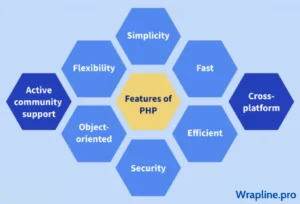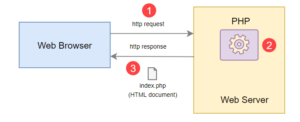What is PHP ?
PHP is an open-source, interpreted, and object-oriented scripting language that can be executed at the server-side. PHP is well suited for web development. Therefore, it is used to develop web applications (an application that executes on the server and generates the dynamic page.).
Some important points need to be noticed about PHP are as followed:
- PHP stands for Hypertext Preprocessor.
- PHP is an interpreted language, i.e., there is no need for compilation.
- PHP is faster than other scripting languages, for example, ASP and JSP.
- PHP is a server-side scripting language, which is used to manage the dynamic content of the website.
- PHP can be embedded into HTML.
- PHP is an object-oriented language.
- PHP is an open-source scripting language.
- PHP is simple and easy to learn language.
Why use PHP ?
PHP is a server-side scripting language, which is used to design the dynamic web applications with MySQL database.
- It handles dynamic content, database as well as session tracking for the website.
- You can create sessions in PHP.
- It can access cookies variable and also set cookies.
- It helps to encrypt the data and apply validation.
- PHP supports several protocols such as HTTP, POP3, SNMP, LDAP, IMAP, and many more.
- Using PHP language, you can control the user to access some pages of your website.
- As PHP is easy to install and set up, this is the main reason why PHP is the best language to learn.
- PHP can handle the forms, such as – collect the data from users using forms, save it into the database, and return useful information to the user. For example – Registration form.
PHP Features
PHP is very popular language because of its simplicity and open source. There are some important features of PHP given below:

Performance
PHP script is executed much faster than those scripts which are written in other languages such as JSP and ASP. PHP uses its own memory, so the server workload and loading time is automatically reduced, which results in faster processing speed and better performance.
Open Source
PHP source code and software are freely available on the web. You can develop all the versions of PHP according to your requirement without paying any cost. All its components are free to download and use.
Familiarity with syntax
PHP has easily understandable syntax. Programmers are comfortable coding with it.
Embedded
PHP code can be easily embedded within HTML tags and script.
Platform Independent
PHP is available for WINDOWS, MAC, LINUX & UNIX operating system. A PHP application developed in one OS can be easily executed in other OS also.
Database Support
PHP supports all the leading databases such as MySQL, SQLite, ODBC, etc.
Error Reporting –
PHP has predefined error reporting constants to generate an error notice or warning at runtime. E.g., E_ERROR, E_WARNING, E_STRICT, E_PARSE.
Loosely Typed Language
PHP allows us to use a variable without declaring its datatype. It will be taken automatically at the time of execution based on the type of data it contains on its value.
Web servers Support
PHP is compatible with almost all local servers used today like Apache, Netscape, Microsoft IIS, etc.
Security
PHP is a secure language to develop the website. It consists of multiple layers of security to prevent threads and malicious attacks.
Control
Different programming languages require long script or code, whereas PHP can do the same work in a few lines of code. It has maximum control over the websites like you can make changes easily whenever you want.
A Helpful PHP Community
It has a large community of developers who regularly updates documentation, tutorials, online help, and FAQs. Learning PHP from the communities is one of the significant benefits.
What can PHP do?
PHP has two main applications:
- Server-side scripting – PHP is well-suited for developing dynamic websites and web applications.
- Command-line scripting – like Python and Perl, you can run PHP script from the command line to perform administrative tasks like sending emails and generating PDF files.
The tutorials on this website mainly focus on server-side scripting.
How PHP Works ?
The following illustrates how PHP works:

How PHP works:
- First, the web browser sends an HTTP request to the web server, e.g., index.php.
- Second, the PHP preprocessor that locates on the web server processes PHP code to generate the HTML document.
- Third, the web server sends the HTML document back to the web browser.
Advantages of PHP
Since PHP is designed for the web in the first place, it brings many advantages to web development:
- Simple – PHP is quite easy to learn and get started.
- Fast – PHP websites typically run very fast.
- Stable – PHP is stable since it has been in existence for a long time.
- Open-source and free – PHP is open source and free. It means that you don’t have to pay a license fee to use PHP to develop software products.
- Community support – PHP has an active online community that helps you whenever you face an issue.
Disadvantages of PHP
- Inconsistency: PHP has been criticized for inconsistencies in function names and parameter orders. This can lead to confusion for developers, especially when working with a mix of older and newer functions.
- Security Concerns: If not handled properly, PHP code may be susceptible to security vulnerabilities, such as SQL injection and cross-site scripting (XSS). Developers need to be cautious and follow best practices to secure PHP applications.
- Performance: While PHP performs well for many web applications, it may not be as fast as some compiled languages like C or Java. However, advancements and optimizations in recent versions have improved performance.
- Lack of Modern Features: Compared to newer languages, PHP may lack some modern language features. However, recent versions of PHP have introduced improvements and features to address this concern.
- Scalability Challenges: PHP can face challenges when it comes to scaling large and complex applications. Developers may need to adopt additional tools or frameworks to address scalability issues.
- Not Suitable for Large-Scale Applications: While PHP is suitable for small to medium-sized projects, it might not be the best choice for extremely large and complex applications where more structured languages might be preferred.
- Limited Object-Oriented Programming (OOP) Support: Although PHP supports OOP, its implementation has been criticized for not being as robust as in some other languages. However, recent versions have introduced improvements to enhance OOP capabilities.















